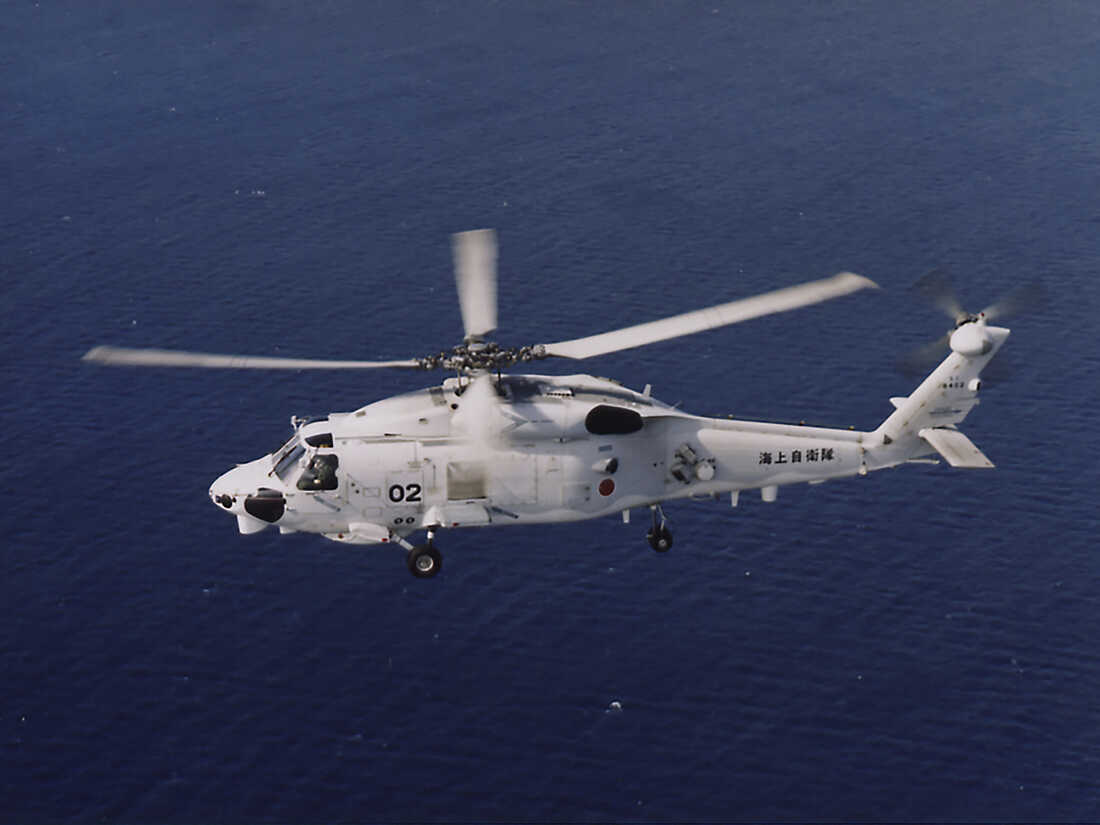Asia
2 Japanese navy helicopters crash in the Pacific Ocean — 1 dead and 7 missing
This undated photo released by and taken from the official website of the Japan Maritime Self-Defense Force, shows a SH-60K chopper. Two Japanese navy helicopters of the same type crashed in the Pacific Ocean south of Tokyo during a nighttime training flight after possibly colliding with each other, the country’s defense minister said Sunday, April 21, 2024.
AP
hide caption
toggle caption
AP
This undated photo released by and taken from the official website of the Japan Maritime Self-Defense Force, shows a SH-60K chopper. Two Japanese navy helicopters of the same type crashed in the Pacific Ocean south of Tokyo during a nighttime training flight after possibly colliding with each other, the country’s defense minister said Sunday, April 21, 2024.
AP
TOKYO — Two Japanese navy helicopters carrying eight crew members crashed in the Pacific Ocean south of Tokyo during a nighttime training flight after possibly colliding with each other, the country’s defense minister said Sunday. One crew member who had been recovered from the waters was later pronounced dead, while rescuers searched for seven others who were still missing.
The two SH-60K choppers from the Maritime Self-Defense Force were carrying four crew each and lost contact late Saturday near Torishima island about 600 kilometers (370 miles) south of Tokyo, Defense Minister Minoru Kihara told reporters.
The cause of the crash was not immediately known, but officials believe the two helicopters “highly likely” collided with each other before crashing into the water, Kihara said.
He added his ministry will suspend training flights for all SH-60s for now.
Rescuers have recovered a flight data recorder, a blade from each helicopter, and fragments believed to be from both choppers in the same area, signs that the two SH-60Ks were flying close to each other, Kihara said. Officials will analyze the flight data to try to determine what led to the crash.
Search and rescue efforts for the missing crew were expanded Sunday, with the MSDF and Air Self-Defense Force together deploying 12 warships and seven aircraft. Japan Coast Guard patrol boats and aircraft also joined the operation.
The helicopters, twin-engine, multi-mission aircraft developed by Sikorsky and known as Seahawks, were modified and produced in Japan by Mitsubishi Heavy Industries. They were on nighttime anti-submarine training in the waters, Kihara said. One lost contact at 10:38 p.m. (1338 GMT) and sent an automatic emergency signal a minute later. They lost contact about 270 kilometers (150 nautical miles) east of Torishima island.
Only one distress call was heard — another sign the two helicopters were near the same place, because their signals use the same frequency and could not be differentiated, Kihara said.
One helicopter belonged to an air base in Nagasaki, and the other to a base in Tokushima prefecture.
The SH-60K aircraft is usually deployed on destroyers for anti-submarine warfare, but is also used for search and rescue and other missions. Japan has about 70 of the modified helicopters.
Saturday’s training only involved the Japanese navy and was not part of a multinational exercise, defense officials said. They said no foreign aircraft or warships were spotted in the area.
Japan, under its 2022 security strategy, has been accelerating its military buildup and fortifying deterrence in the southwestern Japanese islands in the Pacific and East China Sea to counter threats from China’s increasingly assertive military activities. Japan in recent years has conducted its own extensive naval exercises as well as joint drills with its ally the United States and other partners.
Saturday’s crash comes a year after a Ground Self-Defense Force UH-60 Blackhawk crashed off the southwestern Japanese island of Miyako, due to an engine output problem known as “rollback,” leaving all 10 crew members dead, which shocked the nation. In January 2022, a Air Self-Defense F-15 fighter jet crashed off the northcentral coast of Japan, killing two crew.
In 2017, a Japanese navy SH-60J, an earlier generation Seahawk, crashed during a nighttime flight training off Aomori, due to human error. In the U.S., a fatal crash of a MH-60S Seahawk during training off California in 2021 was attributed to mechanical failure from unsuspected damage during maintenance, according to the Navy.
Japan’s NHK public television said no weather advisories were issued in the area at the time of Saturday’s crash.
